From Time Out New York‘s David Fear, Joshua Rothkopf and Keith Uhlich, a list of the 50 Most Deserving Oscar Winners of All Time. The cinematography for Barry Lyndon, Days of Heaven and The Third Man. The musical score for The Sting. Humphrey Bogart ‘s performance in The African Queen and Robert De Niro‘s in Raging Bull. The editing for The French Coonnection. The sound for The Exorcist and Apocalypse Now.
Month: February 2010
Wall Street Looksee
There was an LA screening last night of Oliver Stone‘s Wall Street 2: Money Never Sleeps (20th Century Fox, 4.23). A friend of a friend attended. The first blast (i.e., from the guy who talked to the guy) read as follows: “I’ve heard it’s a strong return to form for both Stone and Douglas. It also proves Shia can play with the big boys. A surprisingly satirical movie. It’s the first time I’ve heard a Stone movie described as ‘fun.'”
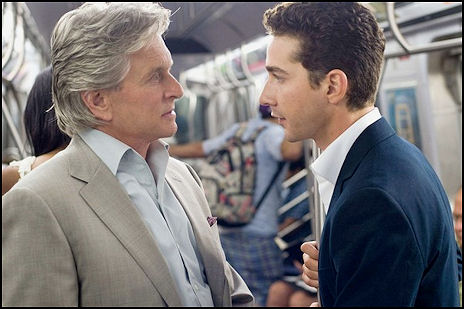
Michael Douglas, Shia Lebouf in Wall Street 2: Money Never Sleeps.
Satirical? Really? I asked for a bit more, and the following came in an hour ago: “It’s an entertaining movie with Shia a better match for Douglas than Sheen, who was a stiff. It’s a sardonic, slightly satirical film with Josh Brolin and particularly Frank Langella scoring well.
“Stone handles the show without either his heavy left hand or his neutered right one that made W not what we’d hoped it. Douglas is the big-ticket item, of course, and revisiting this character is clearly a joy for him as he navigates his way through a world where he’s a player holding a very different hand. Gekko is dealing with stocks while taking his own, and seems like a cobra who’s conflicted about whether to bite…or just charm.
“People will show up for this one, so Fox was right to get it out there quick.”
I then wrote Wall Street 2 producer Ed Pressman, who got back with the following: “Oliver’s first cut is brilliant, witty, complex and emotionally powerful. I couldn’t be happier.”
I was still kind of wondering about the slightly satirical element, so I called someone familiar with Stephen Schiff‘s original script.
“I don’t know whether you ever read Schiff’s script,” he said, “but there are definitely satirical elements in it (the chatter of the hedge-fund guys, the huge Robin Hood Foundation-like charity gala, the Dubai material, the Russian oligarch, the Asian commodities specialist with his Maybach, etc.). Of course, Oliver has always been a fairly earnest filmmaker, but I don’t think satire is particularly rare in his work.
“Natural Born Killers, whether you enjoyed it or not, is certainly satiric in intent from start to finish, and so is W. There is a lot of satiric content as well in Wall Street and Talk Radio and U Turn, and I would argue that there’s some as well in Salvador, Nixon and The Doors.
“Keep in mind, too, that a lot of satire is in the playing. A line or a scene may or may not look satirical on the page, but can be turned in that direction in the performance and even in the cutting.”
Beholden To Marty, Part 3
Two significant reactions have been posted in response to my 2.15 “Rally Round” piece in which I predicted deferential responses to Martin Scorsese‘s Shutter Island because of a “give Marty a pass as long as the film isn’t too bad” impulse that many older critics seem to hold dear. One is an Auteurs piece by Glenn Kenny called “Carrying Marty’s Water“; the other is a piece by Marshall Fine called “In The Tank for Scorsese?.”
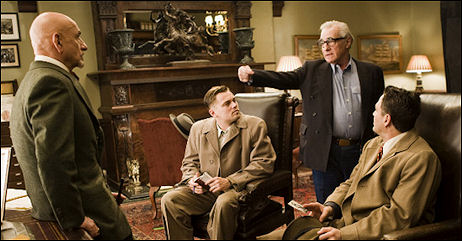
Ben Kingsley, Leonardo DiCaprio, Martin Scorsese and Mark Ruffalo during filming of Shutter Island.
Significant Kenny quote: “If I say that I actively try to find things to like in Scorsese’s films, does that make me a strong Scorsese man, or his patsy, or his water-carrier? I responded very strongly to Shutter Island — but a lot of that had to do with my state of being when I saw the film twenty-two days ago. Is my reaction illegitimate?
“I attended the New York press junket for Shutter Island a couple of weeks ago (the fruits of my labors in this respect are here). Breakfasting with the cream of the television and online video critic crop, I have to say — in all honesty! — that I did detect a note of obligation in their words as I overheard many of them discuss the film. As if they didn’t particularly like it, or ‘get’ it beyond its plot machinations…but that they were going to give it a pass not just because Scorsese’s a revered American filmmaker but because Leo’s a movie star.
“I don’t, however, detect much of the same thing going on in the print reviews.”
I wrote the following to Fine after I read his piece: “I’m not questioning your integrity, Marshall. I’m saying that rooting for an admired director and perhaps bending over backwards to be nice or at least understanding is very human. We all do it. I’ve certainly done this with the Coens (except in the cases of The Ladykillers and The Man Who Wasn’t There). Everyone is prejudiced in one way or another. Nobody is impartial. The best you can hope to be is fair-minded in your dispensations.”
To which he replied: “Thanks, Jeff. I guess what I’m saying is that, while recognizing that no one is impartial, it’s still possible to be honest. Of course, I hope that each Scorsese film (or Coens or Cameron) is great; but I’m also not going to avoid expressing disappointment if it isn’t.
“I don’t take this stuff personally; I don’t take the movies personally either. But I think you do and that’s what makes your work what it is. Indeed, what I find most entertaining and occasionally infuriating about your writing, Jeff, is your absolute sense of being right.
“I have strong opinions and am not afraid to air them, but I guess I stopped worrying/caring about always being right. There is too much evidence in the world at large — and the movies in particular — that suggests that no one cares (and nothing is going to chance because of) what I think. It doesn’t mean I’m going to stop sharing what I think or believing in it, just that I no longer feel that outrage that I used to over what is an immutable fact of life. So who’s the cynic and who’s the idealist?”
Feel Left Out
All these Inglourious Basterds-may-win-the-Best-Picture-Oscar stories have become ubiquitous. In fact, if you’ve got Nicole Laporte, Patrick Goldstein, Tom O’Neil, Jack Mathews, Steve Pond and Pete Hammond saying the same thing, isn’t it fair to call it a blitzkreig?
And I’m feeling kind of hurt about this. How come I haven’t been called by Harvey Weinstein? I can bang this stuff out as well as anyone else. Here, listen: “Is this an excitement tremor or what? Inglourious Basterds is a come-from-behinder, a last-minute sprinter…breathless at the Kentucky Derby! The old ’90s Harvey is back in action! And Quentin’s no spin-slouch either!”
They haven’t called me, I’m guessing, because they see me as too much of a Hurt Locker guy. Too opposed to the baseball-bat scene, etc. But I could at least write about how Harvey has hijacked the Oscar-blog conversation. Even though, as I said two days ago, it’s mainly happening out of columnist boredom.
If I wanted to be contrarian, I could openly ask how Harvey got sop many people whose job it is to be skeptical to suddenly swig the Kool-Aid.
Or I could argue that Harvey has had an Oscar “upset” once in his career — Shakespeare in Love — and it wasn’t really an upset as the film did have the most nominations that year.
Or I could get pissy and argue that Harvey’s suggestion that actors are monolithically voting en masse for Inglourious Basterds because Quentin writes such good parts is arguably deluded if not offensive to almost everyone else in the race. I mean, to suggest that Jason Reitman or any of the other Best Picture screenwriters haven’t written good parts is like…hello?
And I could argue the idea that Inglorious Basterds is a consensus choice in the year of a preferential ballot is laughable. Isn’t any “love it or hate it” movie by nature not a consensus choice?
Or I could just quote this L.A. guy I spoke to this morning — call him a dispassionate pundit — who says that…uhm, well, actually, he goes on a bit so I’m going to give him a stand-alone HE berth. It’s in the story that follows (i.e., is right behind, even though it has a more recent time-code) this one.
One Guy Says…
A guy I spoke to this morning — someone who gets around, knows the industry, talks to people — disputes the whole Inglourious Basterds-is-surging meme. Here’s how he put it in a phone conversation this morning:
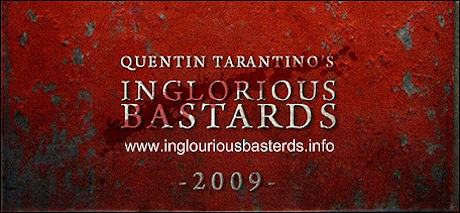
“The reason is that while people like Inglourious Basterds, I don’t think anyone is taking it seriously,” he contends. “Even people I know who are voting for it don’t take it very seriously. It’s one thing to say they ‘like’ a film and another to vote for it as Best Picture. It’s a jokey Nazi exploitation movie. It’s fluff. You don’t vote for something just because you ‘like’ it.
“Quentin this morning in Variety called it The Dirty Dozen redux…which is fine, but this is not the stuff that Oscar movies are made of.
“The other thing is that Harvey’s whole Jewish-revenge shpiel — taking a movie that’s kind of cartoonishly selling Nazis and then turn it around as something Jews should support because it’s a great hit-back-at-the-Nazis revenge movie may be a bit of a backfire among people who take it more seriously, or who’ve actually made holocaust movies.
“Steven Spielberg will not see it, I’m told, because he takes this stuff seriously. It’s no animosity towards Harvey or Quentin, mind, but it does rub people the wrong way. Some Jews like it but there’s a slice of the demographic that can’t get past that poster with the big swatzstika on it…and they just can’t get past Quentin Tarantino doing a japey reflection of the Holocaust movie. I’m talking about Paul Mazursky, Spielberg….that serious-filmmaker crowd.
“When Basterds came out last August nobody thought of it as a serous movie. It was just a popcorn money-maker. And nobody’s raising their fist against it now becaus no one’s taking it seriously. These journalists are just making columns.
“On top of which Harvey says this every year. Everything he ever does is going to win Best Picture. The Road, Nine, The Reader…Nine was going to crush it at the Golden Globes, and Quentin was going to win at the Golden Globes also. But they didn’t even win for Best Screenplay at the Globes. I just think it’s a much-ado about nothing.
“If Inglourious Basterds is so admired by actors, ask yourself this: The Hurt Locker got a Best Actor nomination with Jeremy Renner‘s performance, which is usually indicative of a front-and-center alliance with the film itself, and Inglorious Basterds got a Best Supporting Actor nomination for Christoph Waltz. Why didn’t they give Brad Pitt a Best Actor nomination? There’s a reason for that, I think, apart from the quality of his performance.
Hollywood is simply “overwhelmingly liberal and overwhelmingly likes The Hurt Locker,” he exclaimed. “Sean Penn, Robert Duvall, Charlize Theron, Warren beatty, Helen Mirren, Harrison Ford…Lou Gossett, Jr. They get what it’s about and are with it. Even Jon Voight likes it.”
Phenomenal Publishing
To quote from a 2.17 HuffPost story, to wit: “Wired has been working on a digital version for an Apple tablet since before the iPad was announced. Last week, editor Chris Anderson showed off his magazine’s iPad capabilities, and Wired has now uploaded a video demonstration to its website.
“This is what we’ve been waiting for for 15 years,” Anderson said of the iPad. “We’ve been waiting for an opportunity to use all these visual tools at our disposal to tell these stories in a way that’s efficient, that is multi-dimensional.”
Animal House
Sony Classics’ acquisition of David Michod‘s Animal Kingdom is an obvious change of pace. When was the last time Tom Bernard and Michael Barker had anything to do with a crime flick involving drugs and murders and cops? I spotted the similarities to At Close Range soon enough when I saw it at Sundance. My only hang-up was James Frecheville‘s too-subdued performance as the young lead; to me it suggested either retardation or a lithium overdose.
String ‘Em Up
One interesting aspect of Wall Street 2: Money Never Sleeps (20th Century Fox, 4.23) is that Oliver Stone‘s drama will be opening less than five months after its 11.30.09 wrap date. Obviously the high command at Fox marketing knows that Wall Street rage is peaking right now, and they’re figuring the sooner the better.
Reminder
I spoke yesterday morning with In The Loop director/cowriter Armando Ianucci. The point or goal of our chat was to advance the notion that Ianucci and his Loop co-writers (Jesse Armstrong, Simon Blackwell, Tony Roche ) perhaps deserve to win the Best Adapted Screenplay Oscar more than the competition. If this is so (and I wouldn’t argue against it), it’s because no other film in the history of cinema has made such ringing poetry out of scatalogical rage.
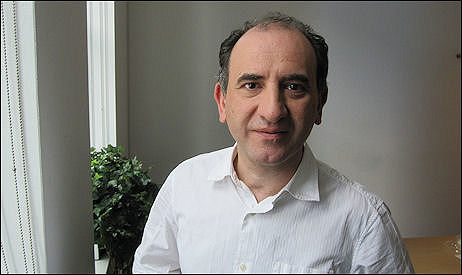
In The Loop director/corwriter Armando Ianucci
I’ve said at least once or twice before that everyone swears, but you need God’s help to make ferocious sputtering meat-puppet swearing — Peter Capaldi‘s, I mean, in his role as Malcolm — sound so delicious and uproarious that people have created websites to celebrate it. This, in a nutshell, is the argument for In The Loop. Take it or leave it. No other screenplay has ever mouthed off like this one.
It needs to be repeated that Capaldi didn’t improvise a thing. Every last fuckity-bye was hatched, honed and typed up by the screenwriters. And then memorized within an inch of its fawking life by Capaldi.
I have an idea that the tide might be running in Ianucci’s favor. Maybe. Then again people might be inclined to give the Oscar to Up In The Air co-authors Jason Reitman and Sheldon Turner as a makeup award in light of the film itself apparently being out of the Best Picture running. Or perhaps they’re thinking the same thing about Nick Hornby‘s adapted screenplay for An Education.
“Strained and Pointless”
N.Y. Times critic A.O. Scott begins his Shutter Island review as follows: “[The film] takes place off the coast of Massachusetts in 1954. I’m sorry, that should be OFF THE COAST OF MASSACHUSETTS! IN 1954! since every detail and incident in the movie, however minor, is subjected to frantic, almost demented (and not always unenjoyable) amplification.”
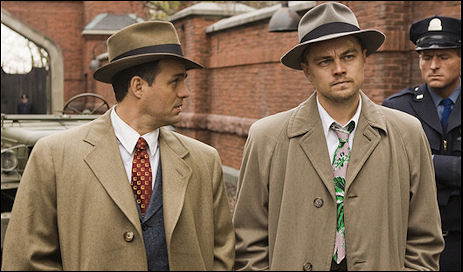
Mark Ruffalo, Leonardo DiCaprio in Martin Scorsese’s Shutter Island.
“The wail of strangled cellos accompanies shots of the titular island, a sinister, rain-lashed outcropping that is home to a mental hospital for the CRIMINALLY INSANE! The color scheme is lurid, and the camera movements telegraph anxiety. Nothing is as it seems. Something TERRIBLE is afoot.
“Sadly, that something turns out to be the movie itself.
“The full dimensions of [this] catastrophe come into view only gradually. At first everything is fine, or at least not quite right in a way that seems agreeably intriguing. Mr. Scorsese uses his considerable formal dexterity — his intimate, comprehensive understanding of how sound and image work together to create meanings and moods — to conjure a tingly atmosphere of uncertainty and dread.
“[But] you begin to suspect almost immediately that a lot of narrative misdirection is at work here, as MacGuffins and red herrings spawn and swarm. But just when the puzzle should accelerate, the picture slows down, pushing poor Teddy into a series of encounters with excellent actors (Emily Mortimer, Jackie Earle Haley, Patricia Clarkson) who provide painstaking exposition of matters that the audience already suspects are completely irrelevant.
“Mr. Scorsese in effect forces you to study the threads on the rug he is preparing, with lugubrious deliberateness, to pull out from under you. As the final revelations approach, the stakes diminish precipitously, and the sense that the whole movie has been a strained and pointless contrivance starts to take hold.
“[Scorsese] seems to have been unable to locate what it is in this movie he cares about, beyond any particular, local formal concern. He has, in the past, used characters whose grasp of reality was shaky — or who stubbornly lived in realities of their own making — as vehicles for psychological exploration and even social criticism. But both Teddy’s mind and the world of Shutter Island are closed, airless systems, illuminated with flashes of virtuosity but with no particular heat, conviction or purpose.”
Go Easy
In his brutal pan of Martin Scorsese‘s Shutter Island, N.Y. Times critic A.O. Scott writes that “there are, of course, those who will resist this conclusion, in part out of loyalty to Scorsese, a director to whom otherwise hard-headed critics are inclined to extend the benefit of the doubt.”
In a thread following a 2.15 riff called “Rally Round,” I wrote that “Scorsese occupies a hallowed place in the hearts of the older, brainier, more thoughtful critics, and that it’s usually in keeping with the character of this crowd to cut Marty some slack whenever a new Scorsese film comes out. [Many of them] very much wanted to like Shutter Island when they sat down in their screening-room seats. And then they saw it. And then they found a way to sing praises.”
